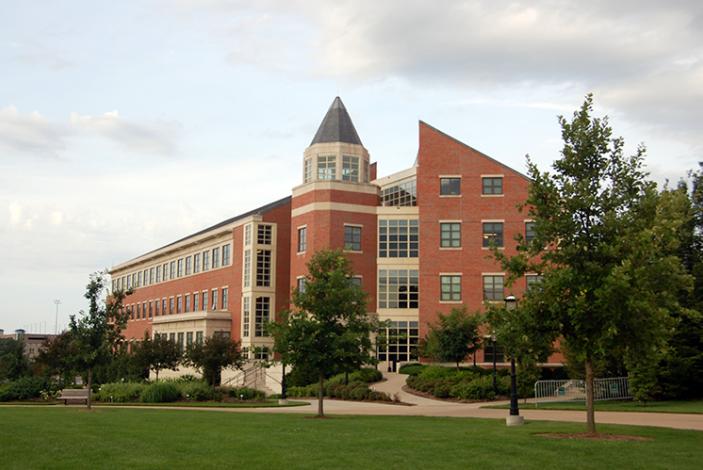
Experiential learning continues in the online environment

When the COVID-19 pandemic sent many students home and University of Missouri classes went online for the remainder of the spring semester, faculty and staff of the Trulaske College of Business found new ways to continue to deliver an experiential learning experience to students across the college.
Graduate programs move remote
For graduate students in the execMBA program, this meant taking the April residency online. This wasn’t a challenge because the execMBA program is already 75% online.
“We are one of the few executive MBA programs in the United States that is mostly online), and we’ve been 75% online since the program began in 2012,” said Barbara Peterson, graduate programs’ director of community engagement and execMBA program manager. “So, while other executive MBA programs are just now moving their programs online, it is business as usual for us.”
During these residencies, execMBA students participate in workshops, case competitions and lectures from guest speakers. For the online version, program coordinators utilized online breakout rooms to foster small group discussions to continue active learning from home and featured three presenters for the professional development series.
Peterson said they also continued the residencies’ usual Friday Night Lights speaker series, albeit remotely. April’s speaker was New York Times bestselling author Diana Kander. She added that May’s residency will also be moved online.
“We are moving the case competition online, as well as other components of the residency, plus offering a virtual graduation celebration,” she said.
Changes for undergrads
Undergraduate students working toward a bachelor of science in business administration are also experiencing changes to their classes that enable them to continue experiential learning projects while at home. The business administration (BA) courses of the Professional EDGE curriculum provide students with a foundation for the professional development principles learned and used in the workplace. Throughout the first three of these courses (BA 1500, 2500 and 3500), students are taught core competencies and may receive the opportunity to use what they’ve learned on projects with partner businesses. The courses culminate in BA 4500, where students undertake a professional internship.
In Lauren Bacon Brengarth’s BA 3500 class, 270 students would normally work on consulting projects with operational businesses in partnership with MU Extension and the MU Office of Service-Learning. With states under stay-at-home orders, those consulting projects have moved online.
“This is the second semester we have done these projects, and to physically go to some of the project locations was a bit of a scheduling challenge at times, particularly for those further from campus,” Brengarth said. “Being online eliminates the time it takes to ‘visit’ the site, because it can be done via Zoom.”
There are 47 consulting projects in the spring semester’s course. Brengarth said she was thrilled to see all of the partner businesses agree to move online in order to see students through their projects to the end of the semester.
“[This] has been a unique learning opportunity,” she said. “BA 3500 focuses on four professional competencies: Leadership, Critical Thinking, Learning Agility and Influencing Others. Quick project adaptation, due to COVID-19 concerns, really created circumstances in which students practiced each of these professional competencies in a multitude of ways throughout the semester.”
Adapting the internship and Professional EDGE requirements
As internships are a required part of Trulaske’s experiential learning curriculum for BS BA students, the Professional EDGE office has also adopted temporary policies to enable more ways in which students can complete the BA 4500 internship requirement.
Restrictions on the number of hours spent working an internship remotely have been relaxed and students also have the option to complete an internship simulation or utilize a previous internship to complete BA 4500.
Many Trulaske students complete more than one internship, according to Bridget Kevin-Meyers, director of the Professional EDGE, explaining how a student may have already completed an internship before taking BA 4500. “Successful completion of BA 3500 is a prerequisite for enrolling in BA 4500. Thus, if students have not completed BA 3500, they are unable to enroll in BA 4500 with an internship opportunity.”
Kevin-Meyers also said all of the Professional EDGE’s programming has moved online, so all students in the BS BA program can continue their professional development and earn EDGE points. For example, presenters for the semester’s remaining in-person events were able to adjust their presentations to live Zoom meetings and recorded videos using Panopto, a recording and streaming platform. The program also uses the application Suitable to track progress and task students with sharing reflections to articles and podcasts about recent events.
The Professional EDGE also used this application to create a Quarantine Resilience badge, which students earned by completing tasks that focus on working remotely, whether it be academic or in the workplace. Badges are comprised of a list of specific tasks and programs from which a student can choose, serving as a reflection of the student’s mastery of the topic. Completing all of the tasks for the Quarantine Resilience badge would earn a student half of the points needed to obtain by graduation.